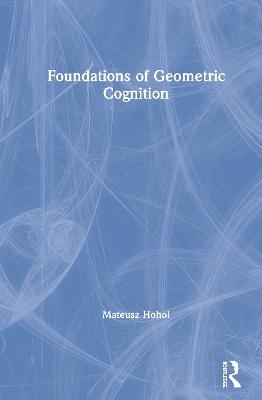
Foundations of Geometric Cognition
Seiten
2019
Routledge (Verlag)
978-0-367-17344-9 (ISBN)
Routledge (Verlag)
978-0-367-17344-9 (ISBN)
Foundations of Geometric Cognition presents an empirically inspired theory of geometric cognition. The book explains how language and diagrams provide cognitive scaffolding for abstract geometric thinking within a context of Euclidean systems of thought.
The cognitive foundations of geometry have puzzled academics for a long time, and even today are mostly unknown to many scholars, including mathematical cognition researchers.
Foundations of Geometric Cognition shows that basic geometric skills are deeply hardwired in the visuospatial cognitive capacities of our brains, namely spatial navigation and object recognition. These capacities, shared with non-human animals and appearing in early stages of the human ontogeny, cannot, however, fully explain a uniquely human form of geometric cognition. In the book, Hohol argues that Euclidean geometry would not be possible without the human capacity to create and use abstract concepts, demonstrating how language and diagrams provide cognitive scaffolding for abstract geometric thinking, within a context of a Euclidean system of thought.
Taking an interdisciplinary approach and drawing on research from diverse fields including psychology, cognitive science, and mathematics, this book is a must-read for cognitive psychologists and cognitive scientists of mathematics, alongside anyone interested in mathematical education or the philosophical and historical aspects of geometry.
The cognitive foundations of geometry have puzzled academics for a long time, and even today are mostly unknown to many scholars, including mathematical cognition researchers.
Foundations of Geometric Cognition shows that basic geometric skills are deeply hardwired in the visuospatial cognitive capacities of our brains, namely spatial navigation and object recognition. These capacities, shared with non-human animals and appearing in early stages of the human ontogeny, cannot, however, fully explain a uniquely human form of geometric cognition. In the book, Hohol argues that Euclidean geometry would not be possible without the human capacity to create and use abstract concepts, demonstrating how language and diagrams provide cognitive scaffolding for abstract geometric thinking, within a context of a Euclidean system of thought.
Taking an interdisciplinary approach and drawing on research from diverse fields including psychology, cognitive science, and mathematics, this book is a must-read for cognitive psychologists and cognitive scientists of mathematics, alongside anyone interested in mathematical education or the philosophical and historical aspects of geometry.
Mateusz Hohol is Assistant Professor at Jagiellonian University, Kraków, and Postdoc at Polish Academy of Sciences (IPS PAS), Warsaw. His research focuses on the cognitive science of mathematics, especially on numerical and geometric cognition.
Preface
Acknowledgements
Chapter 1. Geometric thinking, the paradise of abstraction
Chapter 2. The hardwired foundations of geometric cognition
Chapter 3. Embodiment and abstraction
Chapter 4. Cognitive artifacts and Euclid: Diagrams and formulae
Conclusions and future directions for research
References
| Erscheinungsdatum | 28.09.2019 |
|---|---|
| Zusatzinfo | 3 Tables, black and white; 12 Line drawings, black and white |
| Verlagsort | London |
| Sprache | englisch |
| Maße | 156 x 234 mm |
| Gewicht | 540 g |
| Themenwelt | Geisteswissenschaften ► Psychologie ► Allgemeine Psychologie |
| Geisteswissenschaften ► Psychologie ► Entwicklungspsychologie | |
| Geisteswissenschaften ► Psychologie ► Verhaltenstherapie | |
| ISBN-10 | 0-367-17344-1 / 0367173441 |
| ISBN-13 | 978-0-367-17344-9 / 9780367173449 |
| Zustand | Neuware |
| Haben Sie eine Frage zum Produkt? |
Mehr entdecken
aus dem Bereich
aus dem Bereich
Techniken der Verhaltenstherapie
Buch (2024)
Julius Beltz GmbH & Co. KG (Verlag)
35,00 €


